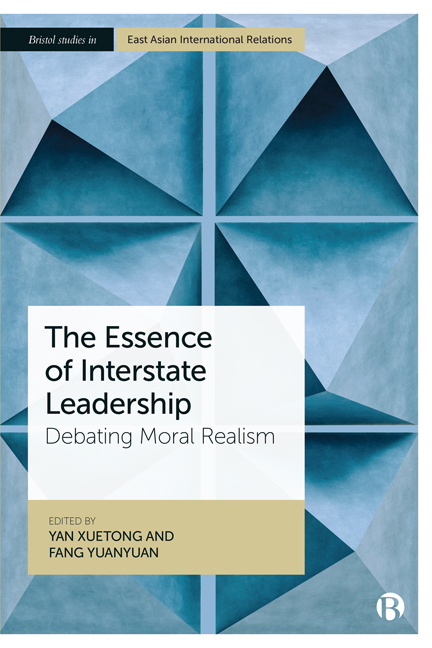Book contents
- Frontmatter
- Contents
- List of Abbreviations
- Notes on Contributors
- Preface
- 1 Interstate Leadership, Moral Realism, and their Critics
- 2 IR Moral Realism as a Universal Theory
- 3 Moral Realism as an Alternative Approach to the Agent-Structure Problem
- 4 Prospects, Promise, and Limitations of Moral Realism
- 5 Ideal Morality and Realist Interest of Moral Realism
- 6 The Conception of Morality in Moral Realism
- 7 Moral Realism and Hegemonic Transition
- 8 Innovation of Moral Realism and Dialogue with It
- 9 Moral Realism and Sino-American Relations
- 10 Moral Realism on Interstate Leadership in Response to Critics
- Appendix 1 Written Discussion between Rajesh Rajagopalan and Yan Xuetong
- Appendix 2 ‘Chinese School’ as an Inappropriate Title
- Selected Bibliography
- Index
9 - Moral Realism and Sino-American Relations
Published online by Cambridge University Press: 18 January 2024
- Frontmatter
- Contents
- List of Abbreviations
- Notes on Contributors
- Preface
- 1 Interstate Leadership, Moral Realism, and their Critics
- 2 IR Moral Realism as a Universal Theory
- 3 Moral Realism as an Alternative Approach to the Agent-Structure Problem
- 4 Prospects, Promise, and Limitations of Moral Realism
- 5 Ideal Morality and Realist Interest of Moral Realism
- 6 The Conception of Morality in Moral Realism
- 7 Moral Realism and Hegemonic Transition
- 8 Innovation of Moral Realism and Dialogue with It
- 9 Moral Realism and Sino-American Relations
- 10 Moral Realism on Interstate Leadership in Response to Critics
- Appendix 1 Written Discussion between Rajesh Rajagopalan and Yan Xuetong
- Appendix 2 ‘Chinese School’ as an Inappropriate Title
- Selected Bibliography
- Index
Summary
As China increases its power and influence on the world stage, many observers wonder how its rise will affect the current US- dominated world order. Some have suggested that the existing system will eventually evolve into two rival blocs, like the US– Soviet Cold War. Conversely, rather than bipolarity, it has been suggested that world order will collapse into anarchy, including several great rival powers pursuing their own interests, with no ordering principle and little cooperation among them. As in previous power transitions, China could engage in military conflict against a declining US. Defensive realists believe that the US and China will eventually learn to manage their rivalry so that they can cooperate in areas of shared interest.
These predictions, however, are largely derived from the Western international experience, failing to allow for contemporary differences in regional and historic contexts. One version of the future that uses classic Chinese philosophy is the concept of tianxia (all under Heaven) whereby all nations will defer to China's preferences. In contrast, moral realism combines insights from Pre- Qin Chinese philosophers with classical realism. Based on Pre- Qin philosophy, in addition to the conventional concept of hegemony, the theory distinguishes other types of global leadership – in particular, sage king or humane authority and tyrant. A humane authority provides economic benefits and security to smaller states and thereby wins their support.
The theory of moral realism implies that competition between China and the US is likely to differ from past rivalries between a rising and dominant power such as the US– Soviet Cold War. The goal of the two states is to attain or preserve higher status, which is more intangible and subjective than relative military power. Because of globalization and nuclear weapons, competition for higher status will largely take place in the realm of economics and advanced technology instead of missiles and ideology. Values will also be salient as a result of the election of Joe Biden, who wants to restore America's global and moral leadership after the Trump era of withdrawal and self- interested, transactional foreign policy. The Biden administration could mark an era of competition between the US and China to shape international norms. While these differences conduce to peace, the absence of the clear geographic red lines of the US– Soviet Cold War could result in inadvertent conflicts in the maritime realm.
- Type
- Chapter
- Information
- The Essence of Interstate LeadershipDebating Moral Realism, pp. 162 - 178Publisher: Bristol University PressPrint publication year: 2023



